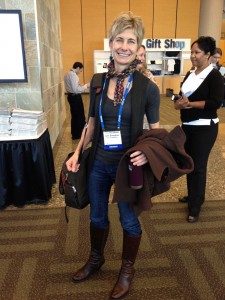3 March 2014
Geo fashion, Wikipedia and Reddit: New social media tips for scientists
Posted by Nanci Bompey

Lynn Soreghan, a professor at the Univiversity of Oklahoma, was one of the women featured in Kim Cobb’s blog on fashion at the AGU Fall Meeting. Wrote Cobb: “I love the effortless-ness of the outfit, impeccably accessorized, with matching coat and boots. It’s ‘earthy’ but modern, and the vest adds a touch of academic elegance.”
Credit: Kim Cobb
One of the most well-read posts on Kim Cobb’s blog is not about her travels around the world as a paleoclimatologist or her visits to congressional offices on Capitol Hill. It’s a 2012 post about women’s fashion choices at the AGU Fall Meeting that got people talking.
Cobb highlighted this occasional dilemma for women in the sciences, showing photos of several successful AGU outfits and also alluding to more serious issues about how women scientists present themselves.
Using a mix of humor, photos and personal stories can help scientists connect with audiences, Cobb said during a communications panel on “Engaging with Social Media” at the American Association for the Advancement of Science (AAAS) meeting Feb. 13 in Chicago.
The panel, which included BoingBoing.net science editor Maggie Koerth-Baker and Danielle N. Lee, a postdoctoral researcher at Cornell University, discussed tips for scientists who want to get involved in social media.
The bottom line, according to Koerth-Baker: If you can’t think of a reason why you should be on social media, you don’t need to be there. “You don’t want to force it,” she said. “Authenticity is the most important thing.”
What else?
- Explore sites like Wikipedia and Reddit. Koerth-Baker said she knows a professor who has his students create and update Wikipedia pages to hone their communication skills. Reddit offers “ask me anything” forums where scientists can earn the public’s trust by answering questions about what they know.
- Pick one. Along the same lines as “you don’t have to be on there”, Koerth-Baker advised that you also don’t have to be everywhere. She is on Twitter and has a blog, but doesn’t do much on Facebook.
- Separate the public and private. Posting about your research and your baby on the same Facebook feed can detract from your credibility, Koerth-Baker said. Consider creating public and private accounts.
- Be a person. Cobb said that part of being accessible to people is showing them that you are human. Personal stories, humor and photos can help to build a following. Write about successes and struggles.
Click here for more tips for scientists on social media.
For more on Cobb’s talk, visit her blog: http://cobblab.blogspot.com/










 The Plainspoken Scientist is the science communication blog of AGU’s Sharing Science program. With this blog, we wish to showcase creative and effective science communication via multiple mediums and modes.
The Plainspoken Scientist is the science communication blog of AGU’s Sharing Science program. With this blog, we wish to showcase creative and effective science communication via multiple mediums and modes.